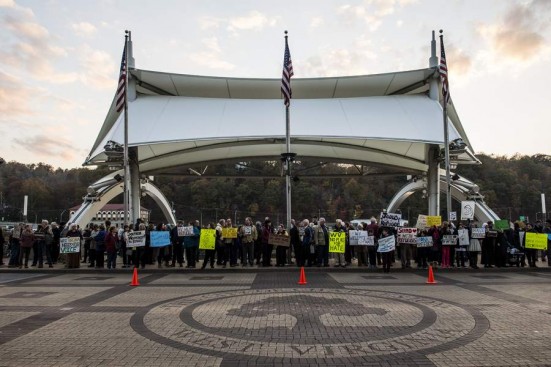
Many people show their support for resettlement.
CHARLESTON, W.Va. — Hundreds gathered in Charleston Tuesday night to show their support for the resettlement of Syrian refugees in West Virginia’s capital.
Speakers at the rally centered their messages around America’s history of taking in refugees and the positive impact they have had on communities. Rabbi Victor Urecki, of B’nai Jacob Synagogue and an immigrant himself, likened resettling refugees to building a bridge to liberty.
“We’re here tonight because when fear, driven by divisive speech and hateful acts perpetrated against those who are marginalized, when fear narrows the bridge that brought us all here, when irrational concerns try to narrow the minds of others and foment the minds of others, we, the bridge crossers, need more than ever to be the bridge builders,” Urecki said. “We all came on that same bridge, and we should promise ourselves that we will never let that bridge collapse — ever.”
Few Syrian refugees have found their way to West Virginia. Although 10,000 were placed in the United States during the previous fiscal year, only five were placed in the Mountain State.
Lynn Clarke, the volunteer president of West Virginia Interfaith Refugee Ministry, is trying to change that. She and her group are trying to get Episcopal Migration Ministries, a group that resettles refugees, to establish a resettlement agency in West Virginia.
Representatives from Episcopal Migration Ministries visited Charleston in May to learn more about the city and meet with its stakeholders. Jeffrey Hawks, a consultant for the group, said Charleston is an ideal place for refugee resettlement but needed clearance from the U.S. State Department before moving forward. Clarke said no refugees would arrive before April 2017.
“Some people worry about money, since this is not a wealthy state. Where will the money come from?” Clarke said. “Bringing refugees takes no money away from West Virginians. If refugees have Medicaid, it’s a separate federal line item and it’s more money coming to the state. Our schools will get more money, but it’s separate money and it’s not taking away from the money our schools badly need.”
Clarke said her group wants to bring 100 refugees to Charleston, roughly 30 each year. Of the 100 refugees, more than half would be children.
Joud Alsabbagh remembers being a child refugee.
“I lived the majority of my life in Syria, most of my childhood years,” she told the crowd. “Honestly, they were great years. I played a lot, I didn’t have school work. But soon, the revolution started.”
She’s 15 years old now, but when she was younger, her family left Syria and immigrated to Jordan. She said her father, who still worked in Syria, was arrested and tortured.
“We decided to come here, to the United States,” she said. “We’re really grateful that we got the chance to. The thing is, it’s not that easy. You don’t just travel to a new country and your life is great. We had to work a lot and we had to work hard.”
A much smaller group of people gathered at the pavilion to protest refugees being settled in West Virginia.
During last year’s rally supporting Syrian refugees, Brenda Arthur stood across the street in protest. She learned of the rally only hours before it was scheduled to begin. She was then one of only two people protesting against it.
This time, she brought a few friends. To them, the reasons to not bring refugees seem endless.
“We had the June flooding disaster, we’ve lost jobs, there have been cuts in school funding and then there’s the drug epidemic,” Arthur said. “We’ve got all of these major problems to deal with. How does it even make sense to bring people here from halfway around the world that are going to need every form of government assistance?”
Arthur, 65, gathered with about a dozen other people in protest of the rally. Their main complaints about settling refugees in Charleston is the fear that they might be sent by the Islamic State in Iraq and Syria and that tax money would be used to resettle them.
But even if it didn’t cost taxpayers anything to bring refugees to West Virginia, and even if officials could be completely sure that the refugees weren’t sent by ISIS, Arthur still doesn’t want them here.
“I don’t think they should be brought here, period. We should take care of them in their homeland,” Arthur said. “A lot of these people, you know, they’ve been in their tribal land for thousands of years, and now they’re uprooted, brought to a new culture — in many cases a culture that has nothing to do with them. Our values are antithetical to a lot of things that they believe.”
To the much larger crowd down the street, lending a helping hand to refugees is an integral part of America’s national identity.
“We’re here tonight because we’re not just bridge crossers. All of us are bridge builders,” Urecki said. “We see those in distant lands yearning to escape war-torn areas and genocide and know that our bridge to America needs to expand wider.”
Reach Jake Jarvis at [email protected], Facebook.com/newsroomjake, 304-348-7939 or follow @NewsroomJake on Twitter.






